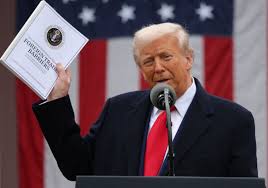President Donald Trump's "reciprocal" tariffs on dozens of countries have officially taken effect, intensifying a global trade conflict that has rattled financial markets and raised fears of a recession. The tariffs, which vary by country, are designed to address what Trump perceives as unfair trade practices and significant U.S. trade deficits.
-
Global Impact: The tariffs affect imports from 86 countries, with rates ranging from 11% to 84%. Notable tariffs include 104% on China, 46% on Vietnam, and 20% on the European Union.
-
Market Volatility: The announcement has led to significant stock market declines, with the S&P 500 losing nearly $5.8 trillion in value since early April.
-
Retaliation Fears: Countries like China have vowed to retaliate with their own tariffs, potentially escalating the trade war and affecting global supply chains.
-
Economic Concerns: Economists warn of increased inflation and potential recession, as higher tariffs could lead to increased consumer prices and reduced economic growth.
This scenario underscores the profound impact of Trump's trade policies on global trade dynamics and economic stability.
Sources: Reuters, CNBC, CNN Business
